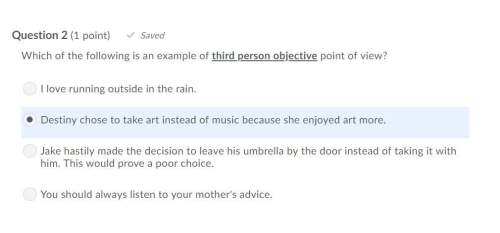Can someone look this over asap< 3
lennie small suffers from an intellectual disability. he...

English, 10.09.2019 22:20 Gearyjames8
Can someone look this over asap< 3
lennie small suffers from an intellectual disability. he is made fun of and called names such as dumb. every one of us is different in their way. however, people with intellectual disabilities were seen as different, but as dumb, uneducated and are made fun of. in the story of mice and men by john steinbeck, he created conflict to show the reader the way people with disabilities were treated in the 1930s. john steinbeck's "of mice and men" brings awareness to the treatment of individuals with special needs. the treatment of people with special needs such as intellectual disabilities has continued to get better in the us in the decades since the great depression. treatment of people with intellectual disabilities in many other countries has been slower to evolve.
in the 1700s and 1800s, people started making places to house people with special needs. these places are dirty and overcrowded. in the article, disability history: early and shifting attitudes of treatment. it states, "they were also unregulated. men and women lived in the same space with little oversight. living at a poor farm was typically involuntary". in comparison to the 2000s, people changed the thought of throwing people in dirty and crowded homes. now we don't have as many of these houses for disabled people. according to the text, early and shifting attitudes of treatment, "changes in treatment of people with disabilities have shifted largely due to the emergence of the disability rights movement in the early 20th century". this proves people had learned everyone should be treated equally no matter if you have disabilities or not.
people with disabilities are unknown as unhealthy and defective. in the article, society’s attitude toward people with disabilities it states, "prior to the twentieth century, social attitudes reflected the view that persons with disabilities were unhealthy, defective and deviant. for centuries, society as a whole treated these people as objects of fear and pity". to put in different words, people were no fan of having others with disabilities in the community. they never treated them like everyone else because they were known for being unhealthy and deviant. the author stated, "there was a strong sentiment toward increased employment of persons with disabilities; 92% polled believed that employment of persons with disabilities would be economically beneficial to society. there is a strong trend toward acceptance. these attitudes are in sharp contrast to the prevailing attitudes of the first half of this century". furthermore, others with disabilities have problems getting jobs and learning because they never have the chance to.
this treatment does not only happen in the usa. many other countries have this problem. one example is russia, in russia people with disabilities, are taken places without consent and barely get the support they need. in the text, russia: adult prospects dim for youth with disabilities the author states," orphanages where children with disabilities grow up often transfer them to closed state institutions for adults when they reach 18 without their consent, human rights watch said today. those who do move into the community often do not receive the support they need to live independently". in other words, the people of russia have disabilities too but they should be able to speak for themselves and have the right support. to continue, in the same article russia: adult prospects dim for youth with disabilities the author states, "others said that orphanage directors pressured them to sign paperwork agreeing to be placed in adult institutions". furthermore, there people that just want to live a normal life have been pressured to signing papers to send them away to adult institutions. these people should be treated like everyone else.
in conclusion, treatment for people with intellectual disabilities has changed since the 1700s. there are still problems in other countries with the treatment of people with disabilities but in the us we have changed. in the us we have more health care and better resources then we did in the 1930s. these resources them get jobs and stay healthy.

Answers: 1


Another question on English

English, 21.06.2019 20:10
Question 4 of 10 2 points in the war of the worlds, martian attack represents the fear that invaders will: o a. destroy people's ability to think for themselves. b. pretend to be friendly. o c. live like parasites off humans. o d. use unknown weapons and technology. submit
Answers: 2

English, 21.06.2019 23:30
Jane addams's memoir, twenty years at hull-house, describes her work with
Answers: 1

English, 21.06.2019 23:30
Drag the tiles to the boxes to form correct pairs. match each of ulysses's characteristics as an epic hero to an event in homer's odyssey. ulysses conceives of a plan to blind the cyclops. ulysses shouts out his name to the cyclops while leaving the island. jove orders calypso to allow ulysses to continue on his journey home. neptune raises storms to throw ulysses's ship off course. place event faces obstacles set by supernatural foes arrowright possesses human frailties and flaws arrowright receives from supernatural friends arrowright is braver and smarter than a typical man arrowright
Answers: 1

English, 22.06.2019 02:00
In what ways do “the lamb” and “the tyger” represent opposite sides of human existence? a. “the lamb” urges passive control, while “the tyger” glorifies man’s dominance over nature. b. “the lamb” urges meek acceptance, while “the tyger” glorifies nature and power. c. “the lamb” urges childlike faith, while “the tyger” glorifies man’s experience.
Answers: 1
You know the right answer?
Questions


Mathematics, 01.06.2021 01:20



Mathematics, 01.06.2021 01:20


Mathematics, 01.06.2021 01:20

Chemistry, 01.06.2021 01:30






Mathematics, 01.06.2021 01:30

Computers and Technology, 01.06.2021 01:30


Spanish, 01.06.2021 01:30






